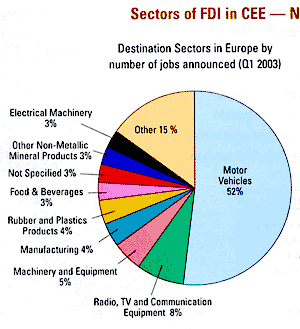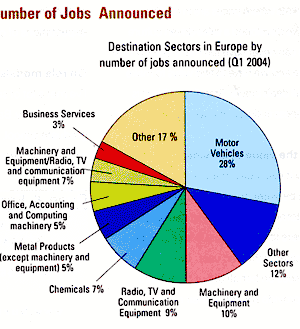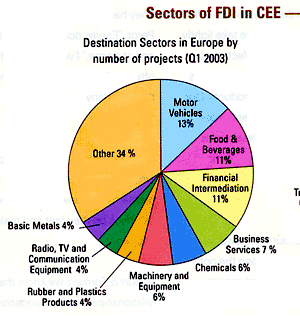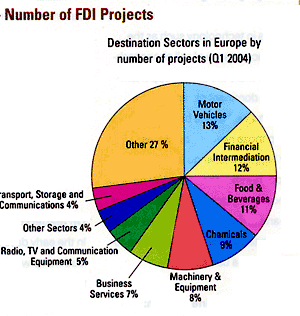|

Heineken Brews Expansion Plans
Thirst for good suds knows no geographic boundaries. Increased
demand has Amsterdam-based Heineken, the world’s second largest brewer,
contemplating several major expansion projects.
Heineken plans to increase its capacity by more
than 50 percent in Vietnam. The Dutch company is in partnership with Singapore’s
Asia Pacific Breweries and a Vietnamese state firm. The partnership will
invest 38 million euros (US$45.1 million) in the project.
Heineken is also investing $392 million in a
brewery outside Seville, Spain, to replace existing facilities in the center
of the city. The new brewery will start producing in 2006, and the move
from the old to the new facility will be completed by 2008. Heineken is
also contemplating a $40-million plant in the Sverdlovsk region of Russia.
Continental AG
Expanding in Americas
and Asia
Anticipating increased de-mand in the NAFTA region,
Hannover, Germany-based auto-motive supplier Continental AG is expanding
production capacity of tires and brake components with new plants in Brazil
and Mexico and a joint venture in Malaysia.
Continental is investing more than 250 million
euros ($US297.1 million) in a new plant in Camacari in the Brazilian state
of Bahia and its joint venture plant in Alor Star, Malaysia. Production
in Brazil will begin at the end of 2005 or early 2006, while production
in Malaysia will begin earlier. More than 1,000 jobs will be created in
Brazil and about 200 in Malaysia. Both facilities will supply passenger
tires to the NAFTA region, said Martien de Louw, Continental’s executive
board member responsible for passenger tires.
“We assume that the market in the NAFTA region
will grow by 11 percent to 382 million passenger tires by 2008,” de Louw
said. “We are getting ready now to deal with this growth.”
Continental’s subsidiary Conti-nental Teves
began brake production in January 2004 at its new 9,300-sq.-m. (100,000-sq.-ft.)
plant in Silao, Mexico. Plans call for the $50-million plant to be at
full capacity by 2006, employing 400. The plant will produce about 3 million
brake boosters for North American customers annually.
Liberac Proving
Prime Czech Location
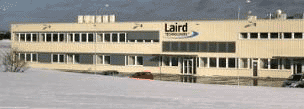 |
Laird Technologies recently opened a new plant in Liberac, Czech
Republic. |
T he Czech Republic attracted more than US$5 billion
in foreign investment in 2003 and continues to be a favorite location
for multinationals looking for a base in central Europe. Liberac, one
of the country’s 14 regions (or kraj in Czech), is the site of several
recent projects. Located in the north-central part of the country, Liberac
enjoys a prime location bordering Germany and Poland. It is also one of
the Czech Republic’s most industrialized regions, with nearly 45 percent
of the work force employed in manufacturing.

Japan-based DENSO Manufacturing, one of the
world’s largest manufacturers of automotive components, is one of the
latest firms finding Liberac to its liking. The automobile air conditioning
specialist will invest up to $255 million in a plant it opened in May
2004, event ually creating more than 900 jobs. The company already employs
more than 600 at other facilities in Liberac.
Seiji Nakagoshi, president of DENSO Manufacturing
Czech, said demand for air-conditioning equipment is rapidly growing in
Europe and the new plant will serve that market. DENSO also operates factories
in Great Britain, Germany and Italy. DENSO is one of about 60 Japanese
companies with manufacturing operations in the Czech Republic.
Laird Technologies, a manufacturer of shielding
materials, has opened a new $19-million plant and development center in
Liberac. The operation will employ 200 within two years. Company officials
say factors in their site decision include good access from Prague and
neighboring countries, flexible cooperation of local authorities and the
nearby presence of the Technical University of Liberac. Laird Technologies
is headquartered in Delaware Water Gap, Pa., and is part of the London-based
Laird Group PLC. Its markets include telecommunications, computers, network
equipment and accessory products for aerospace, defense and medical applications.
Central and Eastern Europe
Are
Gaining More FDI Share in 2004
Western Europe continues
to lose ground to Central and Eastern Europe (CEE) as a destination for
foreign direct investment, according to IBM-Plant Location International,
the Brussels-based Business Consulting Services unit (www.ibm.com/bcs/pli)
that maintains the Global Investment Locations Database (GILD). And the
trend shows no sign of abating. 
Eastern Europe’s portion of the projects coming
to Europe rose from 35 percent in the first quarter of 2003 to 42 percent
in the first quarter of 2004. By jobs associated with FDI, too, Eastern
Europe won 39 percent of the total in the first three months of 2004,
up from 34 percent in the same period in 2003. Western Europe’s share
fell from 66 percent to 61 percent.
More specifically, Russia remains the leading
destination by number of projects with 21 percent in the first quarter,
according to the GILD data. Poland (13 percent), Hungary (11 percent),
Czech Republic (10 percent) and Slovakia (7 percent) round out the top
five. In terms of jobs, the order gets shuffled, with Slovakia claiming
22 percent, followed by Poland (21 percent), the Russian Federation (14
percent), Czech Republic (14 percent) and Romania (9 percent).
The charts below show how industrial sectors
fared in the first quarter of 2004 compared with the same quarter in 2003
in terms of number of projects and jobs.
|




